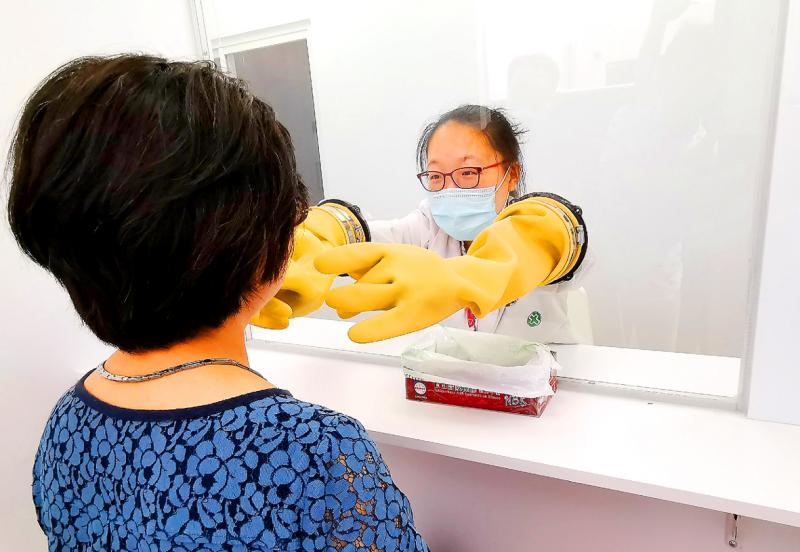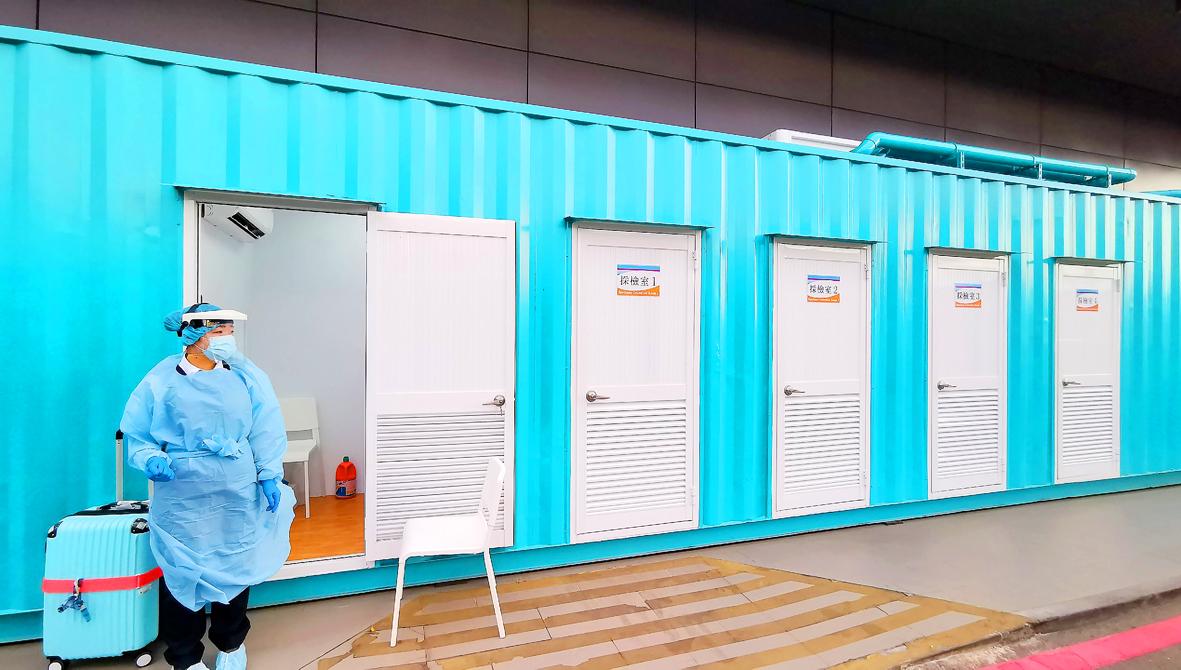The Central Epidemic Command Center (CECC) yesterday reported one new imported case of COVID-19, a Taiwanese woman in her 30s who traveled to the Philippines in late January for work.
Case No. 452 returned to the nation alone on Tuesday, the center said.
On June 30, her company arranged for her to take an antibody test, the result of which was negative, Centers for Disease Control Deputy Director-General Chuang Jen-hsiang (莊人祥), who is the center’s spokesman, said at a news conference in Taipei.

Photo: Tony Yao, Taipei Times
On Tuesday afternoon, the woman began experiencing an “abnormal” sense of smell, which she reported to authorities when she arrived in Taiwan that night, he said.
She was tested for COVID-19 at the airport, before being sent to a quarantine facility, the center said.
On her flight to Taiwan, the patient was seated in the first row and wore a mask for the duration of the flight, Chuang said.

Photo: Tony Yao, Taipei Times
Health authorities have identified 12 people as having had contact with case No. 452, including a passenger who was seated in the row behind her, and 11 flight crew members, the center said.
The other passenger has been placed under home isolation, while the crew members, who had taken proper protective measures, are practicing self-health management, it added.
As of yesterday, Taiwan has recorded 452 confirmed cases of COVID-19, including 361 imported cases, 55 local infections and 36 cases from the navy’s “Friendship Flotilla,” as well as seven deaths, CECC data showed.
Meanwhile, Taoyuan International Airport Corp yesterday began using new facilities to collect specimens to test for COVID-19 at the Taiwan Taoyuan International Airport.
The specimen-collection structures, two converted 12.19m shipping containers, will be where passengers visiting or returning from pandemic-affected nations or regions can be tested.
The containers — outside Terminal 1 and Terminal 2 — were designed to meet requirements governing the collection of diagnostic specimens from air passengers, the airport operator said.
Each has five inspection rooms, where staff and passengers are separated by walls and acrylic partitions, it said, adding that they have separate air-conditioning systems as well.
When necessary, each inspection room can accommodate more than one passenger at a time, the company said.
Staff members only need to wear gloves, insert their hands into two holes in the partition and gather samples, it said.
Each inspection room would be ventilated through a high-efficiency particulate air system, and workers use alcohol and ultraviolet light to disinfect and sterilize the facilities, it said.
All samples are temporarily stored in a separate room before being sent to medical laboratories, to prevent the spread of the disease, the company said.
The airport had previously used two makeshift facilities outside the terminals to collect specimens. Each was built with wooden partitions and did not have a roof for ventilation purposes, it said, adding that staff members were required to wear full protective gear and could only handle one passenger at a time.

POSITIVE DEVELOPMENT: Japan and the US are expected to hold in-depth discussions on Taiwan-related issues during the meeting next month, Japanese sources said The holding of a Japan-US leaders’ meeting ahead of US President Donald Trump’s visit to China is positive news for Taiwan, former Japan-Taiwan Exchange Association representative Hiroyasu Izumi said yesterday. After the Liberal Democratic Party’s landslide victory in Japan’s House of Representatives election, Japanese Prime Minister Sanae Takaichi is scheduled to visit the US next month, where she is to meet with Trump ahead of the US president’s planned visit to China from March 31 to April 2 for a meeting with Chinese President Xi Jinping (習近平). Japan and the US are expected to hold in-depth discussions on Taiwan-related issues during the

‘LIKE-MINDED PARTNER’: Tako van Popta said it would be inappropriate to delay signing the deal with Taiwan because of China, adding he would promote the issue Canadian senators have stressed Taiwan’s importance for international trade and expressed enthusiasm for ensuring the Taiwan-Canada trade cooperation framework agreement is implemented this year. Representative to Canada Harry Tseng (曾厚仁) in an interview with the Central News Agency (CNA) said he was increasingly uneasy about Ottawa’s delays in signing the agreement, especially as Ottawa has warmed toward Beijing. There are “no negotiations left. Not only [is it] initialed, we have three versions of the text ready: English, French and Mandarin,” Tseng said. “That tells you how close we are to the final signature.” Tseng said that he hoped Canadian Prime Minister Mark Carney

President William Lai (賴清德) yesterday bestowed one of Taiwan’s highest honors on Saint Vincent and the Grenadines (SVG) Ambassador Andrea Clare Bowman in recognition of her contributions to bilateral ties. “By conferring the Order of Brilliant Star with Grand Cordon on Ambassador Bowman today, I want to sincerely thank her, on behalf of the Taiwanese people, for her outstanding contribution to deepening diplomatic ties between Taiwan and SVG,” Lai said at a ceremony held at the Presidential Office in Taipei. He noted that Bowman became SVG’s first ambassador to Taiwan in 2019 and

A man walks past elementary school artworks at the Taipei Lantern Festival in Ximen District yesterday, the first day of the event. The festival is to run from 5pm to 10pm through March 15.